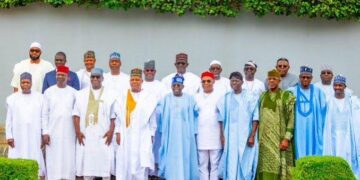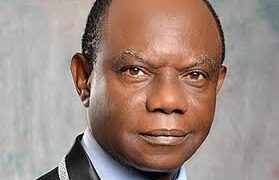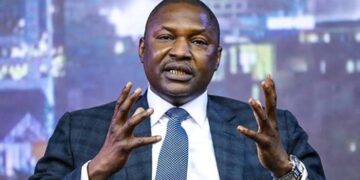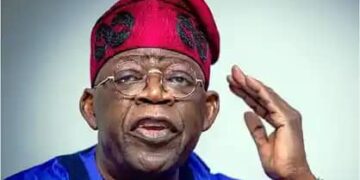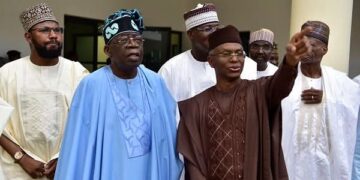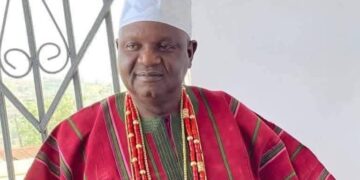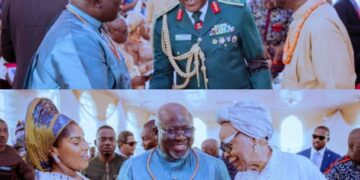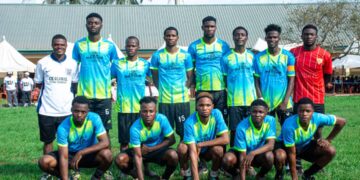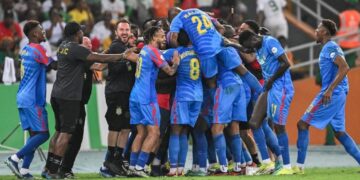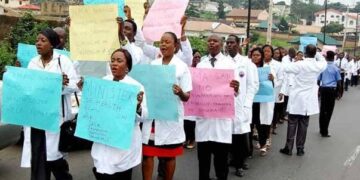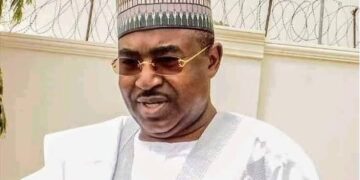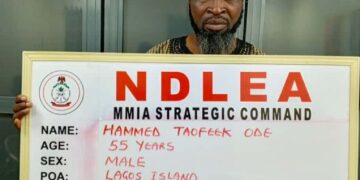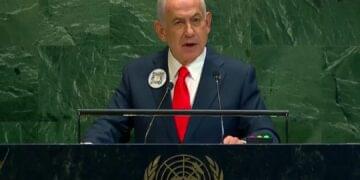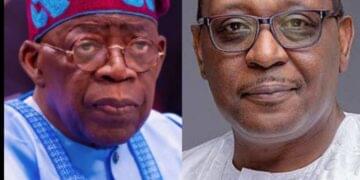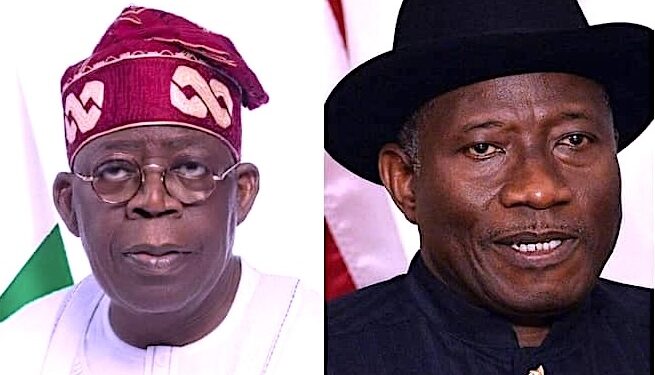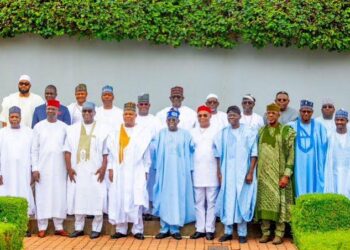Like the fabled tortoise that’s never absent in stories, former President Goodluck Jonathan’s lately the talk-of-the-town – and the “beautiful bride” courted for drafting into the presidential contest in the 2027 General Election.
The one-term (or “two-term”) president (2010-2015) – relishing another four-year stay at the Presidential Villa, Abuja, Nigeria’s capital city – has increased his visibility, as he consults with stakeholders, to seal his ticket, and victory at the poll.
Dr Jonathan’s viability has attracted scrutiny from potential rivals, with the Presidency on September 29, 2025, dismissing him as “no match” for President Bola Tinubu of the All Progressives Congress (APC), and questioning his eligibility for 2027.
Former Minister of Information, Prof. Jerry Gana, stirred the hornet nest on September 28, when he claimed that Jonathan would be flagbearer of the main opposition Peoples Democratic Party (PDP), saying Nigerians “are yearning for his return to power” (a catchphrase deployed by handlers to drum support for then-Head of State, Gen. Sani Abacha, to shed his junta uniforms for civilian clothes – a dream cut short by his death in June 1998).
At the PDP congress in Niger State, Gana – famous for preaching to Nigerians to do their professional jobs well (e.g., “If you’re a teacher, you teach well,” “If you’re a banker, you bank well,” If you’re a police officer, you police well”) – said: “In 2015, Jonathan said his ambition was not worth the blood of Nigerians.
“Since 2015, we’ve had another President (the late Muhammadu Buhari) for eight years and now another (Presdent Tinubu) for two years. Nigerians have seen the difference, and they are asking us to bring back our friend, former President Goodluck Jonathan. I can confirm that he will contest in 2027 as PDP’s candidate.”
Reacting to Gana’s claim, the Special Adviser to the President on Information and Strategy, Bayo Onanuga, while affirming Jonathan’s “inalienable right to contest the presidency again,” warned that “any such bid would face judicial scrutiny.”
“The jury will determine whether Jonathan, who was sworn in twice as president, satisfies the constitutional requirements and is eligible to contest the presidency and be sworn in, if successful, for a third term in office,” Mr Onanuga said.
Unsolicited, Onanuga advised Jonathan to be “wary of the PDP sugar-coated cheerleaders,” such as Gana, who “seek to lure him into the race for personal, political, religious, and ethnic interests,” and “abandon him midstream, as they did in 2015.”
Actually on September 5, Jonathan recalled his “betrayals” by “trusted” aides and political allies in his failed 2015 re-election, exempting only the likes of his former Chief of Staff and ex-Deputy Governor of Edo State, Chief Mike Oghiadomhe, whom he described as a dependable friend and ally.
At Oghiadomhe’s 70th birthday ceremony in Edo’s capital city of Benin City, Jonathan said: “I became president, then post-presidency, one of the few friends that can give up their necks for me is Mike. You know politics, in the Nigerian standard, is about betrayals.
“You find it difficult to see somebody who will say the same thing in the morning and in the evening. I’ve witnessed a lot of betrayals, especially (in) my 2015 election, and Mike is somebody who would take a bullet on my behalf.”
Eligibility issue – as it did in the lead-up to the 2023 poll when he’d postured for a comeback – has trailed Jonathan since the crisis-torn and depleted PDP floated the moves to entice him into the race.
Critics, legal minds, and media talkingheads have poured over Section 137(1)(b) and 137(3) of the amended 1999 Constitution of Nigeria, as it relates to whether Jonathan’s sworn-in once or twice as president from when he served out the remainder of the first term of President Umaru Musa Yar’Adua (2007-2010), who died in 2010.
While Section 137(1)(b) of the Constitution bars a person from running for President if “he has been elected to such office at any two previous elections,” 137(3) says, “A person who was sworn-in as President to complete the term for which another person was elected as President shall not be elected to such office for more than a single term.”
But Jonathan – in tune with an Esan proverb, which says, “You have to put containers in place (to gather water) before rainfall”– foresightedly obtained an order of a Federal High Court in Yenagoa, Bayelsa State, on May 27, 2022, clearing him as eligible to contest in the 2023 General Election, with no inhibition from Section 137(1)(b) and 137(3) of the Constitution.
As first reported by Vanguard on September 7, the verdict came from a writ filed by two APC members (Andy Solomon and Ibidiye Abraham), praying the court to determine if, having regard to Section 137(1)(b) and 137(3) of the Constitution, Jonathan was eligible to contest the 2023 presidency; should the APC field him; and the Independent National Electoral Commission (INEC) approve his candidacy?
To which the trial Justice Isa H. Dashen, expressing his opinion on submissions made before him on May 27, 2022, quoted Jonathan (1st Defendant) as countering thus:
“With respect to the provisions of Section 137(3) of the Constitution, the 1st Defendant stated that from Exhibit EKO1 (i.e. the Official Gazette of the 4th Alteration of the Constitution), ‘Commencement’ date of the said amendment to the provisions of Section 137 of the Constitution therein contained is said to be ‘7th Day of June, 2018’.
“Therefore, the 1st Defendant contended that the amendment introduced by sub-section (3) of Section 137 of the Constitution came into effect and became operational from 7th June, 2018.
“On the basis of the foregoing, the Defendant contended that since he took the first oath of office as President in year 2010 and the second oath of office in year 2011, respectively, the 4th Alteration of the Constitution, which took effect from the 7th June, 2018 cannot be applied retrospectively to prevent him from exercising his right to contest for the Office of President of the Federal Republic of Nigeria, which said right accrued to him since year 2015 before the 4th Alteration to the Constitution was effected.”
Justice Dashen, noting the failure of the 2nd Defendant (APC), and 3rd Defendant (INEC) to disprove the 1st Defendant’s counter-affidavit (indicating admission of the 1st Defendant’s position), quoted supporting rulings of the Supreme Court, and said:
“As earlier stated, both 2nd and 3rd Defendants did not file any processes in response or reaction thereto despite service of the Originating process on them.
“In the locus classicus case of OYEYIPO vs OYINLOYE (1987) I NWLR (Part 50) 350, the Apex Court held thus: ‘A Defendant, who fails to enter appearance or file Counter-Affidavit in response to the averments in support of the Originating Summons, would be presumed to have Demurred and admitted the facts deposed to in the Affidavit filed in support of the Originating Summons.”
As Justice Dashen observed: “Having carefully considered the arguments of the parties, I am of the view that the determination of the application or otherwise of the provisions of sub-section (3) of Section 137 of the Constitution to the 1st Defendant lies on the juxtaposition of the date when the 1st Defendant claims to have acquired his present right to be sworn-in as President and the date on which sub-section (3) of Section 137 of the Constitution took effect.
“The starting point is to acknowledge the fact that sub-section (3) of Section 137 of the Constitution was not originally part of the corpus of the Constitution. Sub-section (3) of Section 137 of the Constitution was introduced by the 4th Alteration to the said Constitution.
“Although the 1st Defendant attached the Official Gazette wherein this (4th) Alteration (of the Constitution) was published as Exhibit EKO1 (i.e. Exhibit) to his Counter-Affidavit, this Court is empowered to take judicial notice of the law by virtue of the provisions of Section 122(2)(a) of the Evidence Act 2011.”
The judge continued: “A cursory look at Exhibit EKO1 (i.e. Exhibit) will reveal that the 4th Alteration introduced a restriction with regard to the number of times a person, sworn-in as President of the Federal Republic of Nigeria to complete the term for which another person was elected, can be sworn-in as President after completing the remainder of the said term.
“Sub-section (3) of Section 137 of the Constitution states that any person who was so sworn-in shall, after completing the term of such other person, be eligible to be only elected to the office of President for a single term.
“Further scrutiny of Exhibit EKO1 (i.e. Exhibit) also reveals that the 4th Alteration was enacted by the National Assembly in 2017; however, the ‘commencement’ date for same was expressly set for ‘7th Day of June, 2018.'”
Justice Dashen then declared: “Having the benefit of reading the Official Gazette (i.e. Exhibit EKO1), I therefore have no difficulty in holding that provisions of subsection (3) of Section 137 of the Constitution took effect from 7th June, 2018. And I so hold.”
Interpreted, it means that Section 137(3) of the Constitution can’t be retroactively applied to prevent Jonathan from exercising the right that accrued to him since 2015 when he failed re-election for a second term in office.
Yet, as he consults – and stands out as the “beautiful bride” courted by parties to fly their presidential flag, the eligibility issue continues to dog Jonathan’s path to return to power in 2027 or in any other election cycle!
*Mr Ezomon, Journalist, writes from Lagos, Nigeria.

